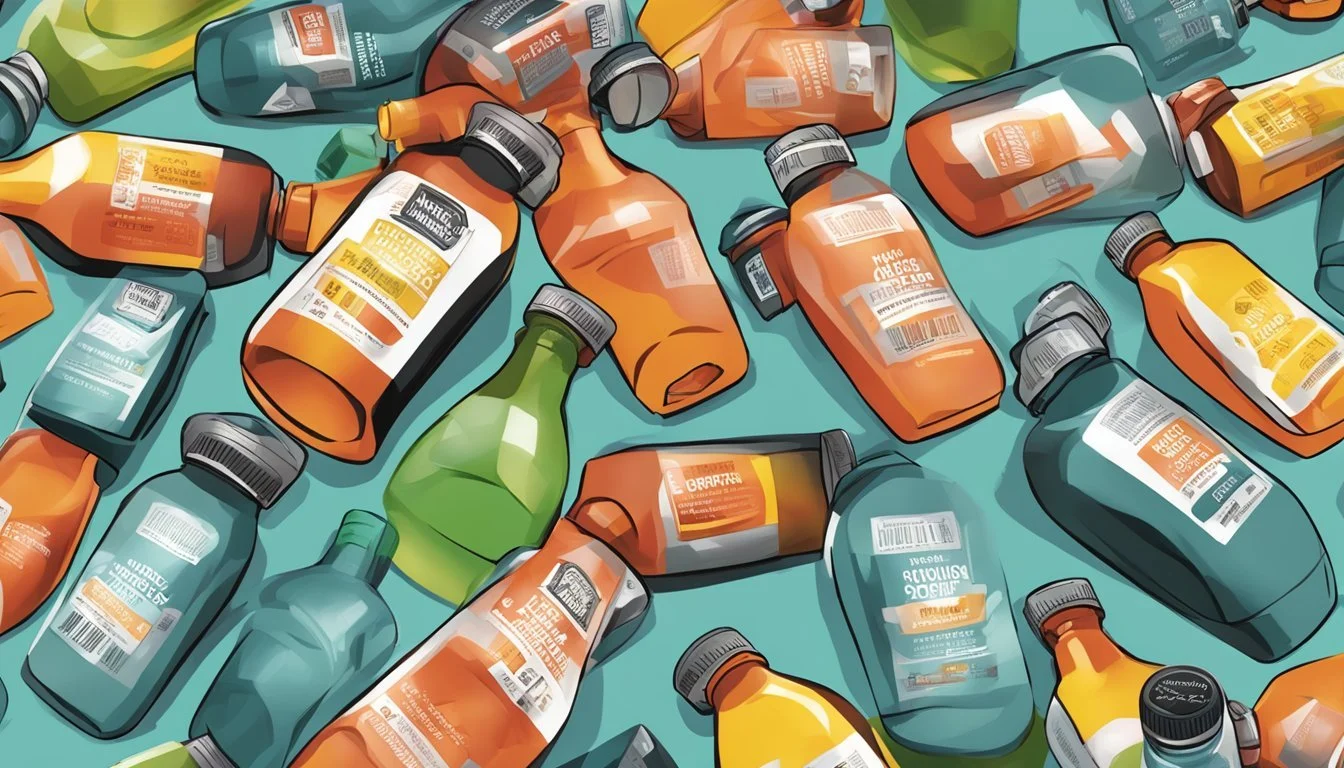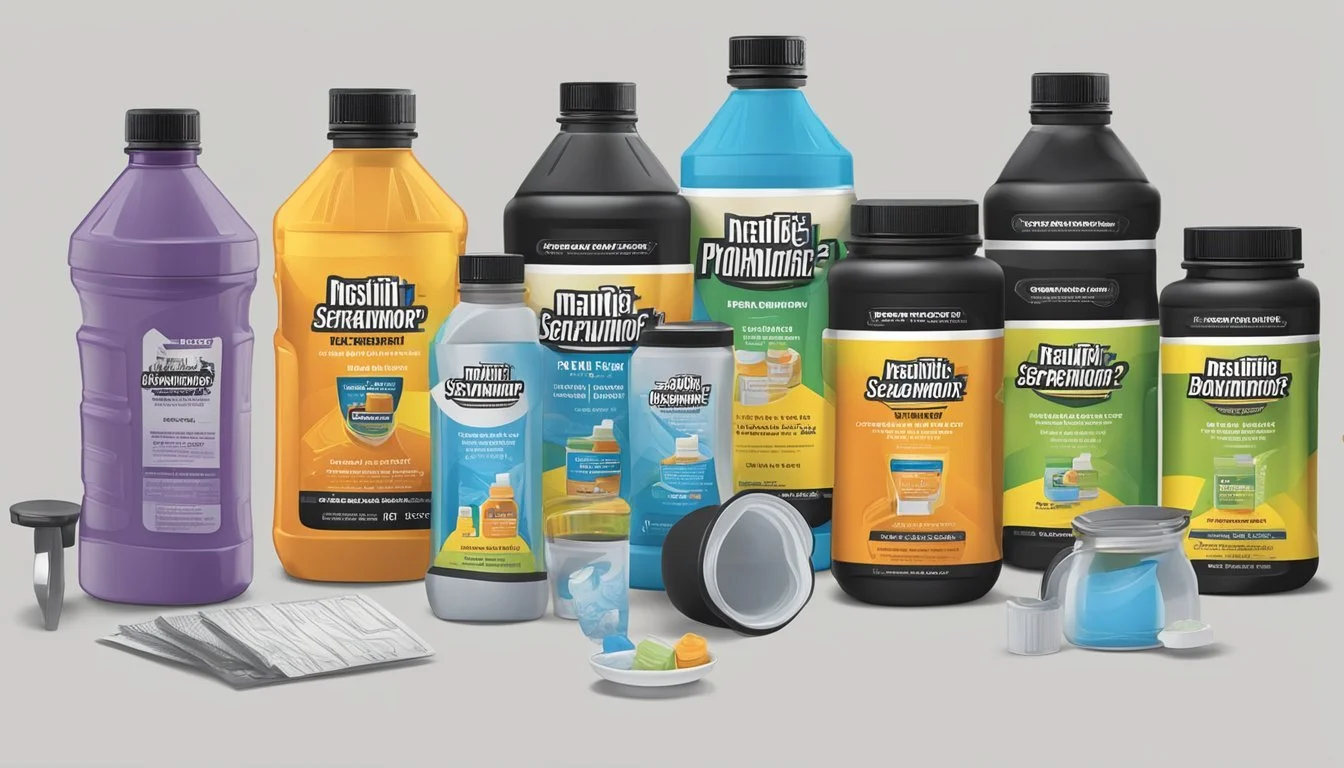How Many Servings of BodyArmour Is Too Much
A Clear Guide
Staying hydrated is crucial, especially for athletes and active individuals, but how many servings of BodyArmor is too much? This popular sports drink boasts a range of essential electrolytes and vitamins designed to enhance performance and hydration. Yet, the high sugar content in some variants raises questions about how much is safe to consume.
A single serving of BodyArmor typically contains 21 grams of cane sugar, which can add up quickly if you're having multiple bottles throughout the day. For those watching their sugar intake, this is a significant factor to consider. On top of that, BodyArmor Edge contains added caffeine, which can also compound if consumed in excess.
While BodyArmor provides a good balance of potassium and sodium, overconsumption can lead to unwanted sugar intake and potential health risks associated with high caffeine levels. Staying mindful of your overall diet and hydration needs is essential to make the most of this sports drink without overdoing it.
Understanding BodyArmor Ingredients
BodyArmor drinks contain a mix of electrolytes, vitamins, natural flavors, and sugars that aim to cater to hydration and energy needs. This section will break down these key components to provide clarity on their roles and effects.
Electrolytes and Their Roles
Electrolytes are essential for hydration, muscle function, and nerve signaling. BodyArmor drinks are particularly high in potassium, with about 530mg per 12-oz serving, which is beneficial as many people have low potassium levels. They also contain around 30mg of sodium, which is considerably less than some other sports drinks like Gatorade. Additional electrolytes include magnesium and calcium, which help maintain fluid balance and support muscle contractions.
Vitamin Content and Health Benefits
BodyArmor is enriched with several vitamins, focusing on those that aid in energy metabolism and immune support. Each serving provides significant amounts of Vitamin C and Vitamin E, both known for their antioxidant properties. B Vitamins (B3, B5, B6, B9, and B12) are included to help convert food into energy and support cellular health. These vitamins collectively contribute to general wellness and replenishing nutrients lost during physical activities.
Sugar, Sweeteners, and Caloric Content
A notable aspect of BodyArmor is its sugar content. One 12-oz serving contains 21 grams of cane sugar, which contributes to its 70 calorie total. While this amount of sugar enhances taste and provides quick energy, it might be a concern for those monitoring their sugar intake. The drink does not contain artificial sweeteners, relying solely on natural cane sugar and erythritol (a natural sweetener) for sweetness. The high sugar content should be considered, especially for individuals trying to minimize added sugar in their diet.
Natural Ingredients Versus Added Elements
BodyArmor emphasizes the use of natural flavors and ingredients. The drinks avoid artificial sweeteners and synthetic additives, opting instead for cane sugar and erythritol to enhance taste naturally. They also incorporate coconut water concentrate, which naturally boosts electrolyte content. This blend keeps the drink within a more natural profile, making it appealing to those looking for beverages without artificial elements.
By focusing on these ingredients and their specific roles, consumers can make well-informed decisions about how BodyArmor fits into their hydration and nutrition routines.
Health Considerations and Dietary Impact
When evaluating the health considerations of consuming BodyArmor, it's essential to examine potential side effects, implications for specific health conditions, and its role in weight management. Additionally, an analysis of the drink's artificial components and preservatives is necessary.
Potential Side Effects of Overconsumption
Consuming BodyArmor in excessive quantities may lead to several side effects. Due to its high sugar content, an overuse could result in spikes in blood sugar levels.
This can pose risks for individuals with insulin sensitivity or diabetes. Additionally, the accumulation of various vitamins and minerals could disrupt the body's natural balance.
High potassium intake, for example, can lead to hyperkalemia, affecting heart functions. Monitoring intake is crucial to avoid these adverse effects.
Assessing Implications for Diabetes and Heart Disease
For individuals with diabetes, BodyArmor's carbohydrate and sugar load is a significant concern. Regular BodyArmor contains 18g of carbs per 8-ounce serving, which can quickly add up.
Even the low-calorie BodyArmor Lyte has 14g per serving, likely too high for strict low-carb diets. Elevated and frequent sugar intake elevates the risk of glycemic spikes, stressing the body's insulin response.
Heart disease patients need to be cautious about the sodium content, though BodyArmor is relatively low in sodium with 15-20mg per serving. Choosing suitable variants aligned with individual dietary needs is essential.
BodyArmor's Caloric Impact on Weight Management
Examining BodyArmor’s caloric content is vital for weight management. A single 8-ounce serving has about 70 calories. For individuals watching their caloric intake, these can contribute significantly if consumed in large quantities.
Weight gain can occur if the consumption of these calories exceeds the energy expended. To integrate BodyArmor healthily into the diet, it should be consumed mindfully, particularly for those monitoring their weight.
Opting for low-calorie versions like BodyArmor Lyte can be an effective strategy to enjoy the drink without excessive caloric intake.
Evaluating Artificial Components and Preservatives
BodyArmor’s ingredient list includes various artificial components and preservatives, which should be examined. Artificial sweeteners, especially in lower-calorie options, may have different effects on individuals.
Some may experience digestive discomfort or other side effects. Preservatives used to extend shelf life can also have varying impacts on health.
While BodyArmor promotes itself as having natural flavors and colors, it’s essential to verify these claims and understand that reactions can differ between individuals. A balanced approach with full awareness of the ingredients is crucial for making informed choices.
Optimal Consumption for Athletic Performance
Proper hydration, essential vitamins, and a balance of nutrients play crucial roles in enhancing athletic performance and recovery.
Hydration and Endurance Enhancement
Hydration is critical for maintaining endurance during training and competition. Athletes should aim to stay hydrated before, during, and after exercise. Bodyarmour drinks can aid in this by providing fluids and electrolytes.
Maintaining adequate hydration helps regulate body temperature and prevent cramps. Electrolytes such as potassium and sodium found in Bodyarmour support muscle function and aid in the prevention of dehydration. Athletes should be mindful of their individual hydration needs, which can vary based on intensity and duration of physical activity.
Vitamins and Minerals for Athletic Recovery
Vitamins and minerals are essential for muscle recovery and reducing the risk of injuries. Nutrients in Bodyarmour, like vitamins A, C, and E, can boost immune function and aid in tissue repair.
Minerals such as magnesium and calcium support bone health and muscle function. Ensuring adequate intake of these nutrients is vital for sustaining peak performance and minimizing downtime due to injuries. Athletes should incorporate a diversified diet along with sports drinks to meet their recovery needs.
Balancing Energy Levels and Nutrient Intake
Balancing energy levels is essential for performance. Bodyarmour can provide a quick source of carbohydrates, which are the primary fuel for high-intensity activities. Ensuring the right balance of macronutrients—carbohydrates, proteins, and fats—is necessary for sustained energy and endurance.
Energy drinks should complement a well-rounded diet. Excessive consumption can lead to unwanted calorie intake and potential imbalances in nutrient levels. Athletes must balance their consumption with whole foods to maintain optimal athletic performance and overall health.
Comparative Analysis to Other Sports Drinks
When comparing BodyArmor to other sports drinks, individuals should consider nutritional differences and healthier alternatives. These factors are crucial to making an informed decision about daily consumption limits. Below, the analysis breaks down key differences and better choices.
Nutritional Differences with Traditional Sports Drinks
BodyArmor and Gatorade are two popular sports drinks with significant differences.
BodyArmor:
Sugar Content: Each 16 oz bottle contains 21 grams of sugar. The Lyte line offers a lower sugar option with only 2 grams per bottle.
Nutrients: High levels of potassium, vitamins, and coconut water.
Gatorade:
Sugar Content: Approximately 36 grams per 16 oz serving.
Nutrients: Lower in potassium, uses artificial ingredients.
The American Heart Association recommends men limit sugar to 36 grams per day and women to 25 grams per day. High sugar content in sports drinks can exceed these recommendations if not monitored.
Assessment of Healthier Alternatives
For those seeking healthier options, BodyArmor Lyte and BodyArmor Edge are noteworthy alternatives.
BodyArmor Lyte:
Sugar Content: Only 2 grams per bottle, significantly lower than traditional sports drinks.
Base Ingredient: Uses coconut water, enhancing hydration naturally.
BodyArmor Edge:
Caffeine: Contains added caffeine for an energy boost.
Sugar Content: Higher than Lyte but balanced with the energetic component.
Traditional Sports Drinks often have high sugar and artificial additives. Choosing drinks with lower sugar content aligns better with health guidelines. The nutrient-rich options like BodyArmor's varieties provide hydration and energy without the excess sugars found in many traditional products. This makes BodyArmor a compelling choice for health-conscious consumers.
Consumption Guidelines
Drinking BODYARMOR sports drinks can provide valuable hydration and nutrients, but it is important to follow established guidelines to avoid consuming excessive sugar and calories.
Recommended Intake Limits
The American Heart Association recommends limiting added sugar intake to 36 grams per day for men and 25 grams per day for women. Each 16-ounce bottle of BODYARMOR contains 21 grams of sugar. Consequently, a single bottle can cover a substantial portion of these daily limits.
For most adults, consuming more than one bottle per day may lead to excessive sugar intake, impacting overall health. Excess sugar consumption is linked to various health issues, including weight gain and cardiovascular diseases.
Here is a quick breakdown of sugar content:
BODYARMOR (16 oz): 21 grams of sugar
Daily Limit for Men: 36 grams of added sugar
Daily Limit for Women: 25 grams of added sugar
Given this information, it is advisable to limit oneself to one bottle of BODYARMOR per day to stay within these recommendations.
Importance of Moderation and Balance
Moderation is crucial when incorporating BODYARMOR into a balanced diet. While the drink offers hydration and nutrients like potassium, it should not replace other essential fluids and foods in the diet. Water should remain the primary source of hydration.
To achieve nutritional balance, consider pairing BODYARMOR with a well-rounded diet rich in fruits, vegetables, lean proteins, and whole grains. This approach helps to ensure adequate intake of necessary nutrients without relying too heavily on sports drinks.
For those engaging in intense physical activity, the electrolytes and vitamins in BODYARMOR can be beneficial. However, it is still important to monitor overall sugar and calorie intake to avoid negating the health benefits of exercise.
FAQ and Misconceptions
Understanding how many servings of BodyArmor is too much involves addressing common concerns and clarifying misconceptions about its ingredients, like caffeine and electrolytes.
Addressing Common Queries
How many servings of BodyArmor can one drink in a day?
For most people, consuming 1-2 servings of BodyArmor per day is generally safe. Each serving contains essential electrolytes such as potassium (600 mg) which helps in maintaining fluid balance and preventing cramps. However, the high sugar content (21 grams per serving) should be monitored, particularly for individuals managing calorie or carbohydrate intake.
Does BodyArmor contain caffeine?
Most BodyArmor drinks do not contain caffeine, except for BodyArmor Edge, which has 140mg of caffeine per 28.03oz serving. It is akin to consuming an energy drink, and therefore, should be consumed with caution, especially by those sensitive to caffeine.
Debunking Myths Around Sports Drinks
Myth: BodyArmor provides the same hydration benefits as water.
Fact: While BodyArmor contains coconut water, electrolytes, and B vitamins, making it beneficial for hydration and recovery during intense physical activity, plain water remains the optimal choice for everyday hydration due to the absence of added sugars and calories.
Myth: All sports drinks are loaded with sodium.
Fact: BodyArmor contains a relatively low amount of sodium (30mg per 12oz serving) compared to other sports drinks like Gatorade. This can be beneficial for those who are conscious about their sodium intake, particularly individuals with high blood pressure.
Myth: Sports drinks are necessary for every workout.
Fact: For moderate workouts, water is usually sufficient for hydration. BodyArmor and similar sports drinks are more suited for intense or prolonged physical activity where there is significant electrolyte loss through sweat.








